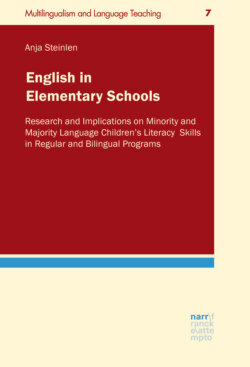Читать книгу English in Elementary Schools - Anja Steinlen - Страница 24
На сайте Литреса книга снята с продажи.
2.3.4 Bilingual programs as “elitist” programs
ОглавлениеIn Germany, bilingual programs are considered to be ‘elitist’ because they often are attended by students with particular personal, intellectual, or familial characteristics. This is partly due to the fact that schools do not always randomly assign students to a particular program, especially when there are more applicants than places (see e.g., Apsel, 2010; Genesee, 1987; Swain & Lapkin, 1982; Zaunbauer & Möller, 2007). Student-selection factors may include the age-appropriate knowledge of the L1, the ability to concentrate, perseverance, commitment and/or communication abilities (e.g., Kersten, Fischer, Burmeister, Lommel, Schelletter, Steinlen & Thomas, 2010b). For example, employing a large longitudinal study comparing students in mainstream and IM elementary schools in Germany, Zaunbauer & Möller (2007, see also Zaunbauer & Möller, 2006, 2010; Gebauer, Zaunbauer & Möller, 2012, 2013) reported that in grade 1, IM students outperformed their peers in mainstream programs in a nonverbal intelligence test and pointed out that these cognitive differences may also point to prior selection effects (see also chapter 2.6).
Elementary schools may discourage parents of struggling learners (e.g., dyslexic children and children with auditory / perceptual / concentration problems) to attend an IM program, often reasoning that such a program would be too large of a burden for such children (Fischer, 2019). Other schools have opted for an alternative solution: when more students than can be accepted to the bilingual program have applied for admission, these students are randomly assigned to a bilingual or regular school program. For example, many IM schools, particularly in Canada, employ a lottery system, as in the case of the St. Lambert school (e.g., Genesee, 1987). Ideally, then, the IM students would be identical to regular students in all respects, except that they would be enrolled in different programs. Indeed, the results of nonverbal intelligence tests carried out in the St. Lambert school did not show any differences between first graders in the IM and in the regular program (e.g., Lambert & MacNamara, 1969; Lambert & Tucker, 1972; Genesee, 1987).
The three schools where data have been drawn for this study deal very differently with the admission of students in their bilingual programs (see chapter 4.1 for more information). The Muhlius Schule in Kiel and the Platanus Schule in Berlin offer only one FL program, and that is a bilingual one. However, the Muhlius Schule is a public school, catering to a relatively high number of students with learning difficulties or associated problems that hinder learning (e.g., Steinlen & Gerdes, 2015), and there are no restrictions on admission. The Platanus Schule in Berlin is a private school, and the children are preselected for cognitive, linguistic and communicative skills (see Steinlen & Piske, 2018c). The Hügelschule in Tübingen, finally, has offered both a regular program and a partial immersion program since 2008/09 (e.g., Steinlen, 2016, 2017, 2018a, b; Steinlen & Piske, 2013, 2015, 2016a, b, 2018, 2020; Tamm, 2010). So far, a lottery system had to be employed only once. However, as teachers and the heads of the school point out, preselectional effects cannot be ruled out because the parents usually enroll their child in the bilingual program when they are very confident that s/he would indeed be able to master it without any difficulties (see also Apsel, 2012; Zydatiß, 2009: 161 for similar impressions). Despite this, the results of a nonverbal intelligence test conducted in grade 1 in this school, with 256 students attending either a regular or a bilingual program, did not indicate any significant differences between the two groups (Yadollahi, Steinlen & Piske, 2020, see also Steinlen & Piske i. pr.).
